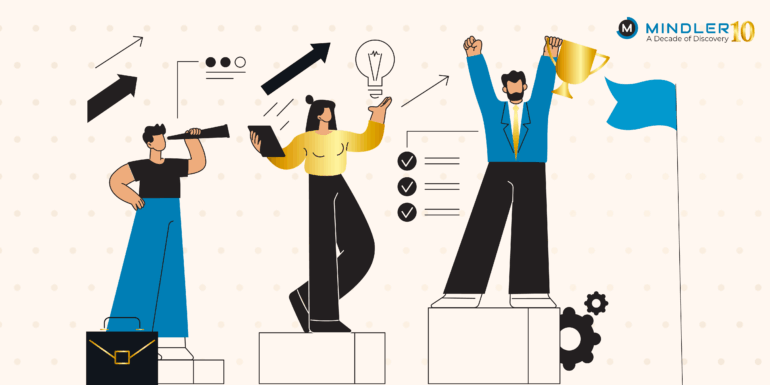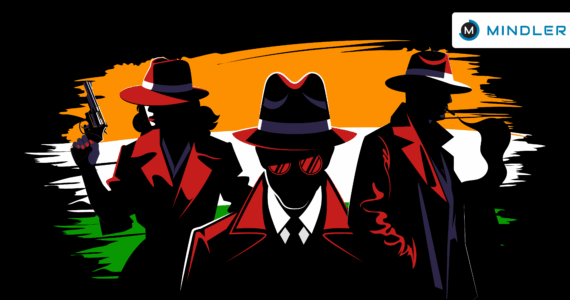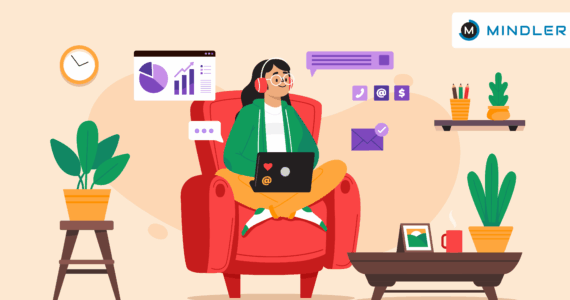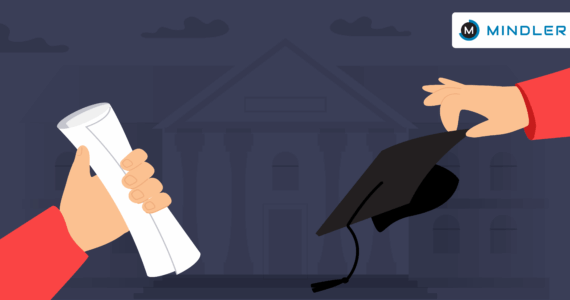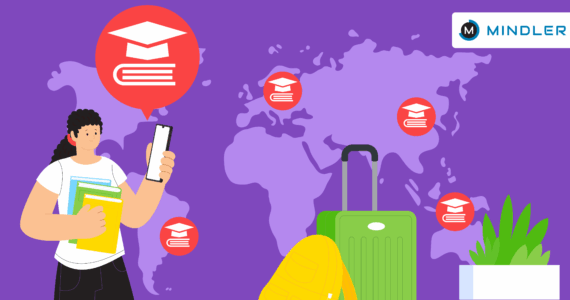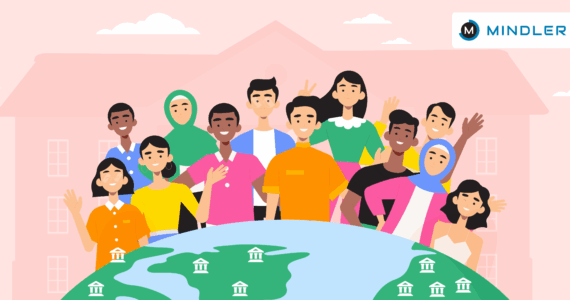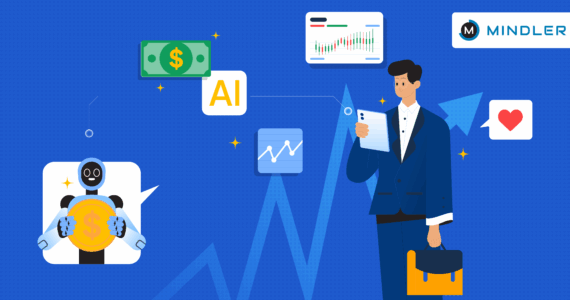In 2015, a bright student in Jaipur told a visiting educator, “I’m pursuing engineering because my older cousin did it.” When asked what she truly wanted to do, she hesitated. “I’ve never really thought about it that way.”
That conversation, as recalled by Prateek Bhargava, founder and CEO of Mindler, would plant an inextinguishable dream in him – birthing a movement that impacted career guidance across India and beyond over the next decade.
An entire generation was navigating careers blindfolded. The issue was widespread, and this gap created an opportunity for new solutions.
What followed was a complete rewiring of how career counselling in India operates. Today, students inhabit an entirely different universe of possibilities than their predecessors. This is the story of that evolution.
This is the story of Mindler.
1. Approach to Career Clarity
2015: Career guidance in 2015 relied heavily on basic aptitude tests and subjective interpretation.
Most assessments followed a one-size-fits-all approach, often reducing complex personalities to simplistic categories. The advice was broad, generic, and rarely tailored to individual strengths or circumstances.
The shift to technology-driven, multi-dimensional analysis marked a watershed moment in career guidance. Guesswork became precision through algorithms that could process complex profiles and match suitable career paths.
Working with leading psychometrician Prof. N.K. Chadha and his team, Mindler spent over 15 months developing one of the most advanced psychometric assessments for students in India – a comprehensive 5-dimensional assessment evaluating interests, personality, aptitude, EQ, and orientation style, mapped to 52 career clusters using proprietary algorithms.
This test was the backbone on which Mindler would build their legacy. For many students and parents, the report was an ‘Aha!’ moment and the first time they felt truly understood.
Bhargava recalls, “A mentor once told me: “Build a product so good that even your toughest critic can’t ignore it.” At the time, we were still wrestling with how to make technology feel human. That advice pushed us to go deeper with our tech, to make it not just intelligent, but intuitive.”
A new era of career discovery had begun.
2025: Mindler’s latest innovations, Nexus and Orion, take those insights even further – harnessing artificial intelligence to understand students like never before.
Nexus, an AI-powered platform, analyzes each student’s unique profile and delivers ideal subject combinations, skill-building activities, and interdisciplinary career matches. Alongside it, Orion acts as a smart career chatbot, answering questions and nudging students toward the right opportunities.
AI isn’t replacing human counsellors, but enhancing them. With this tech, a single counsellor can now provide depth and breadth of guidance that would have been impossible previously.
2. Access to Career Guidance
2015: Career counselling in 2015 was the exclusive domain of metro cities and affluent, informed families.
Sessions were expensive, and students in smaller towns struggled to find professional guidance. Further, 99% of schools operated without dedicated career counsellors at the time.
Reports estimated a shortage of 15 lakh career guidance professionals nationwide. Most students were left to navigate their futures alone, some not even aware of a better way forward.
2025: The landscape of career guidance has never been more accessible.
Through digital platforms and a trained network of coaches, quality guidance can now reach the remotest corners of the country. Students in rural Maharashtra can access the same sophisticated career assessments, technology, and counselling expertise as their counterparts in Mumbai.
Mindler’s role in this transformation has been pivotal.
The International Certified Career Coach (ICCC) Program, launched in collaboration with the National Career Development Association (USA), has introduced over 68,000 professionals to the world of career coaching, and trained them to become leading career coaches across the globe.
“Our first batch included visionary school leaders and principals who had been in education for decades,” says Bhargava. “Despite their experience, they walked into our program with open minds and zero ego.”
The Mindler Partner Platform soon followed, empowering coaches with cutting-edge technology that enabled them to assess, guide, and flourish as successful Coachapreneurs.
Over 300 schools across India also embraced Mindler’s platform, modernising their career guidance approach and proving that with the right tools and training, geography is no longer destiny when it comes to career guidance.
3. Scope of Career Discovery
2015: Back then, career conversations revolved around a painfully narrow menu of options.
Engineering, medicine, law, chartered accountancy, civil services, and MBA – family discussions were dominated by these six or seven paths.
Research revealed that 93% of students knew fewer than seven career options. Millions of diverse talents were forced through identical pathways without ever knowing if they were suited to them.
2025: Today’s students can explore over 250 different career paths, including many emerging fields their parents never knew existed such as AI scientist, marine archaeologist, sustainability consultant etc.
Mindler’s career counselling approach has been instrumental in this expansion, through a comprehensive Career Library, mapping strengths to careers, and school workshops that introduce students to unconventional possibilities.
4. Experience before Choosing Careers
2015: The old paradigm demanded patience.
Real work experience came after graduation. Students made career choices based on theory and hearsay, hoping their assumptions would prove correct years later.
2025: Virtual experiences and early corporate exposure have shattered this timeline. Students can now “test-drive” careers before committing to educational pathways, dramatically improving their career clarity and confidence.
Mindler’s Virtual Career Simulators (VCS) allow students to experience 46 different careers through immersive online simulations. Students role-play as doctors, architects, or marketers – all from home. For a generation raised on video games, it’s a natural segue into career exploration
Equally novel is the Corporate Experience program, exemplified by the partnership with PUMA and HRX. Students can gain authentic exposure and earn official internship certificates from leading global brands.
Thousands of students have already used these platforms to gain meaningful career experiences before college – something that would have been unimaginable a decade ago.
5. Delivery through Mentorship
2015: Career counselling a decade ago was largely transactional.
One session, one report, and you were on your own. There was minimal follow-up, no progress tracking, and certainly no long-term mentorship to navigate the complexities of academic and career planning.
2025: The model has evolved into sustained mentorship relationships.
Mindler’s career guidance ecosystem now offers dedicated mentors who work with students over multiple sessions, sometimes spanning years, providing guidance from career selection through skill development to college applications.
Career decisions aren’t single moments but ongoing processes requiring continuous support. Students now have mentors invested in their long-term success.
6. Stakeholders and Collaborative Journeys
2015: Career choices in 2015 were often made in silos. Students struggled alone while parents imposed outdated expectations.
2025: The ecosystem has evolved into a collaborative network where all stakeholders work in harmony. Parents are educated about modern career options and their children’s unique strengths. Schools integrate structured guidance into their curricula. The approach recognizes that in India, family involvement is inevitable. However, the solution isn’t exclusion but education.
The result is students making informed decisions with the support of parents. No longer does a Farhan in 3 Idiots have to pick engineering because it was prophesied at birth. Now he could pursue wildlife photography with his parents cheering him on.
That change is echoed in schools and coaching communities as well.
As Bhargava reflects, “Over 70% of our student users come through a coach, educator, or school we empowered. That tells me we didn’t just build a brand – we built a movement.”
The Next Decade Awaits
This decade of discovery proves how quickly entrenched systems can evolve when technology, human expertise, and empathy unite. But this is merely the prologue to an even more exciting chapter.
The next ten years will likely witness deeper AI integration, more experiential learning, and unprecedented interdisciplinary opportunities. As work itself evolves – with remote careers, entrepreneurial paths, and AI-human collaboration – career guidance too will continue adapting with Mindler at its forefront.
For students today, the message is clear. You’re limited only by your willingness to discover who you truly are and what unique contribution you can make to the world.
Choose your own adventure, guided by science, supported by mentors, and riding on the winds of infinite possibility.
Ready to discover your unique career path? Reach out to our experts to begin your journey toward career clarity.

